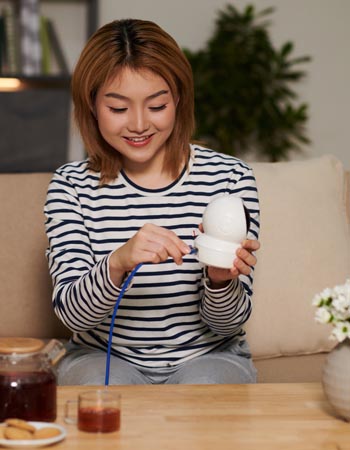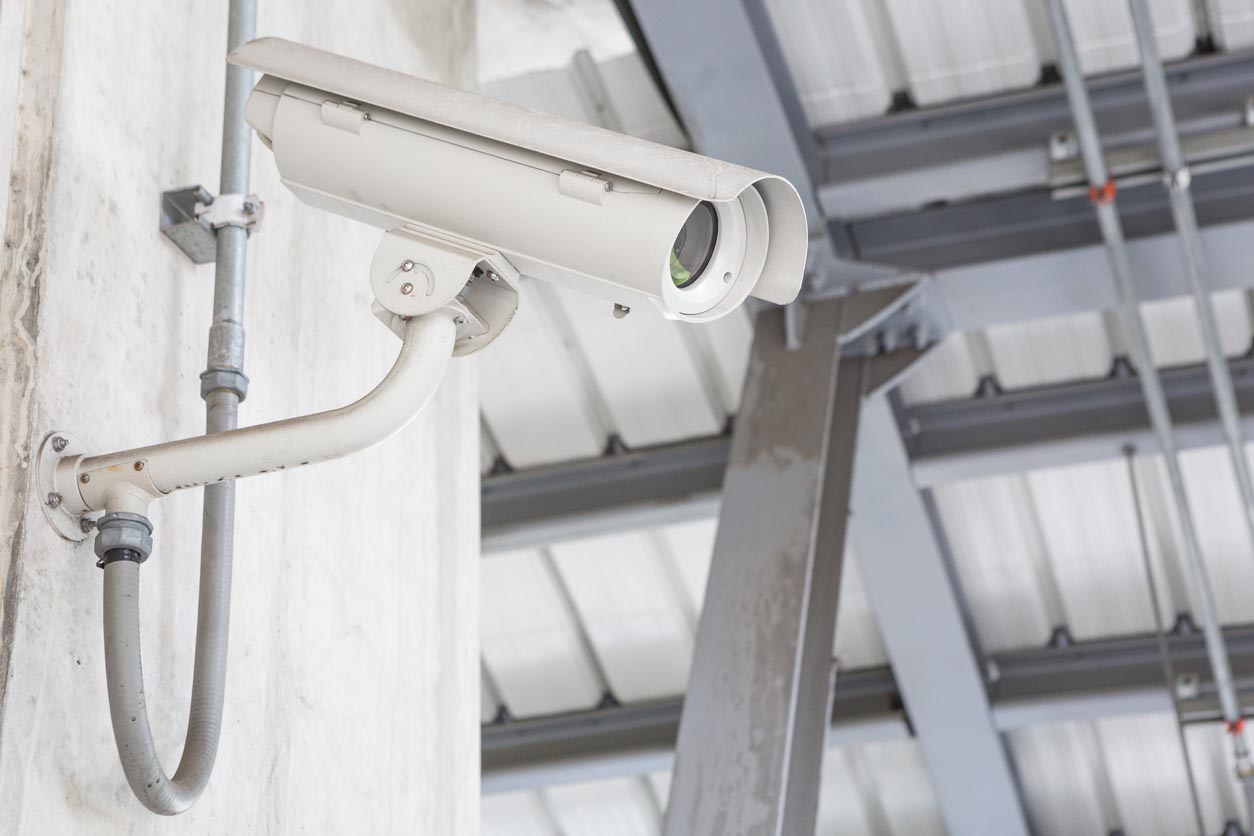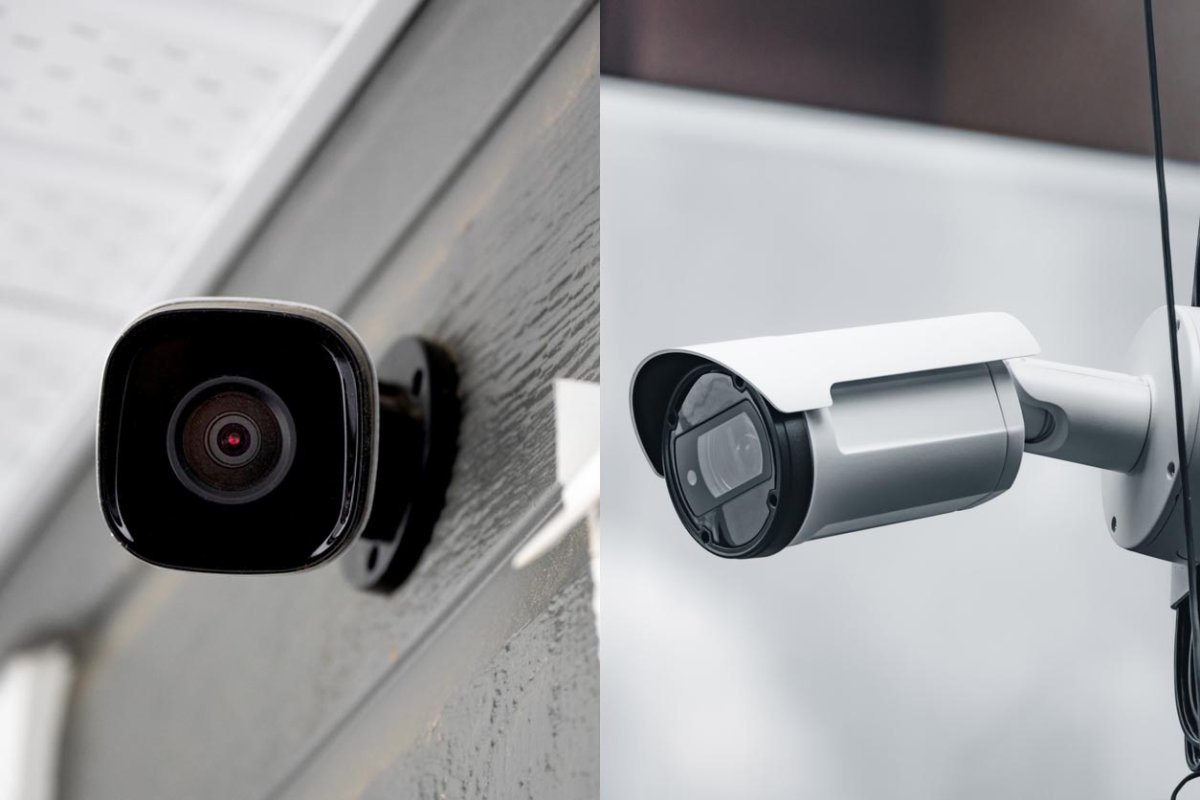We may earn revenue from the products available on this page and participate in affiliate programs. Learn More ›
As security systems become easier to manage with mobile apps and are a more deeply integrated part of a smart-home system, more and more people are choosing to be involved in the selection of security equipment that is installed in their homes, regardless of whether they have hired a professional that knows how to install security cameras or selected from the increasing number of DIY security options. One question that often arises during the selection of equipment is whether wired or wireless security cameras are the better option.
Before getting into the pros and cons of each type of camera, it’s a good idea for customers to understand what to look for in a home security system and clarify what their options are.
- Wired security camera systems are connected by either coaxial cable or CAT5 or CAT6 cables to a recording device, and are powered through this cable. This makes sense—they’re called “wired” because a wire connects the device to the recorder.
- Wireless security camera systems use a home’s Wi-Fi service or cellular service to send video and recordings to a cloud or recording device, hence their name. However, wireless cameras do still require power to function. Some are battery-powered and therefore truly wireless, but most are connected to either a power outlet with a power cord or to a solar charging device, also with a cord. Thus, most wireless cameras are not completely wireless—but they do connect wirelessly to the video storage device.
So when it comes to comparing wired versus wireless security cameras, which one is the better choice? The answer depends on the circumstances and priorities of the home’s residents in terms of quality versus convenience.
1. Wired security cameras are typically designed for professional installation, which may come with an additional cost.

Wired security cameras draw their power from the cable that connects them to the recording device. For many, this is a huge plus, since it means the cameras don’t have to be near a power source. They do, however, need physical wiring to connect to the digital video recorder that will store the footage, making professional installation a necessity in most cases. If installing wired outdoor security cameras, the cable may need to be buried or run along the exterior of the home. Hiring an electrician to deal with opening walls and pulling cable through will add expense to the total security camera installation cost.
The wiring also means that wired cameras are stationary: If a camera needs to be moved, this also means moving its cables. Therefore, if the residents decide they want to reposition a camera, they’ll need to call the electrician again. Because they’re wired into position, wired cameras are considered fixtures in the home, so if the homeowner decides to move, the cameras stay, and the residents will need to purchase new cameras for their next home.
2. Wireless security cameras can usually be installed by the customer with no need to hire a professional.
Wireless security cameras transmit their footage over Wi-Fi to either a physical or cloud server. As long as they can be connected to a power source, they can be placed anywhere within the reach of the router’s signal and moved at will, which makes them easy for users to self-install and move as necessary. When comparing the cost and hassle of installing hardwired versus wireless security cameras, the wireless option is typically the winner.
Connecting to power sources can be a bit of a challenge, especially for outdoor cameras. Most cameras have the option to be plugged directly into an outlet, but in some cases that’s not ideal. Some wireless cameras can operate on battery power, which usually involves rechargeable battery packs. This is a very feasible option for indoor cameras and outdoor cameras that are mounted in places that are easily reachable. For cameras that are mounted on roofs or other difficult-to-access spots, however, changing the batteries is inconvenient at best and dangerous at worst.
Some camera systems offer the option of a small solar panel that mounts near the camera, connects with a cable, and generates solar power to constantly keep the battery pack charged. For those who want cameras mounted in tough-to-access places, a solar charger can be a great option. Most include a cord that is long enough to reach a sunny spot where the panel will get enough sun to keep the batteries powered. These accessories can be mounted easily by homeowners or a handyman who is comfortable on a ladder, and there’s no need for an electrician.

3. Wired security cameras store footage locally and are considered to be more reliable and secure than wireless security cameras.
Some people are concerned about security cameras that use Wi-Fi to communicate with a cloud server or a mobile app: They worry that hackers may be able to get into the Wi-Fi and view images from the cameras, or even watch or manipulate them in real time. While this is a possibility with wireless cameras, the likelihood is low if the residents have followed the best-practice recommendations for firewall and password security. However, it’s virtually impossible for a hacker to break into a wired camera since the data streams through the physical cable and is never unsecured. The data is then stored on a physical DVR until the owners choose to delete it. Cable transfer allows for higher-quality images to be transferred and stored, and it isn’t subject to Wi-Fi blips or outages. It’s also regarded as the most secure option.
Physical storage is safe because the DVR is not connected to the internet or Wi-Fi. But this means that the only way to view the footage is through a physical connection with the DVR, either on a monitor, TV, or computer. Users won’t be able to access their footage from outside the home or check it through a mobile app; everything is secure, but trapped in the DVR until it’s accessed locally. Depending on the customer’s needs, this may be fine, but one of the benefits of Wi-Fi cameras is the ability to immediately see in real time via a smartphone what triggered a camera to turn on in the first place, which isn’t an option with a wired connection to a DVR.
4. Wireless security cameras use cloud storage, which allows users to view footage from anywhere.
In residential settings, both wired and wireless cameras are usually triggered to turn on by a motion sensor. On a wireless camera, the motion sensor causes the camera to begin recording and streaming the data to a cloud server, which is immediately available to the user via a smartphone app. Customers choose a data plan when they set up their service, which incurs a monthly storage cost based on how much data the customer wants to be able to store. For many users, this cost is worth it; having the data in a cloud server means that they can pull up recordings from weeks before if a neighbor or law enforcement officer asks if they have any footage from a particular date and time when a crime was committed. The cloud access also means that parents can check their phones to see children arriving home from school; that family members of elderly relatives can check in if the motion sensors are triggered at their loved one’s home at an odd hour; and that images and footage can immediately and quickly be shared online or with law enforcement if a crime has been committed.
While many feel the extra storage cost on top of any subscription charges is worth it, others prefer the security of a wired system. Wireless systems are, in fact, easier to hack into, simply because there are more entrance points. All the firewalls and intricate passwords on the router won’t make a difference if a phone with no passcode is lost while being permanently signed into the home security app. Customers who choose wireless cameras will want to be aware of the potential for hacking and take all necessary steps to secure not just the cameras and the routers, but any device that allows access to the security footage in the cloud.

5. Wired security cameras typically come with a battery backup, which means they’ll continue to work even if the network goes down.
Because wired cameras don’t rely on Wi-Fi, an internet outage won’t affect their ability to record. A power outage, however, just might. Fortunately, wired systems have been around for a long time, and kinks in the system have largely been worked out. To address the potential of a power outage, most wired systems include a battery backup, either in each individual camera, in the DVR itself, or both. In most cases the batteries are charged by the steady power supplied by the home’s electricity so they are ready to step up and keep the system working in the event of a power or network outage.
6. Wireless security cameras are typically easier to install, adjust, and move than wired security cameras, which often makes them better suited for renters.
After the customer has determined where to place their security cameras, smaller wireless cameras can often be installed with a removable adhesive strip. As long as they’re placed near a power outlet or connected to a battery or charger, the cameras can be moved from room to room or repositioned quickly and easily. When the cameras do require hardware, installing them is usually a matter of one or two small screws. This makes wireless systems easy to DIY and also makes it simple to adjust the system as security needs change. So for ease of installation and adjustment, the battery-powered wireless option takes the top prize.
Renters have long been mostly excluded from home security systems. The systems of the past were bulky, difficult to install (almost impossible to DIY), and expensive—plus the equipment couldn’t transfer easily from one address to another. The flexibility of wireless cameras has changed that, and it’s made home security far more accessible for renters. Especially considering that renters are reliant on landlords or management companies for most aspects of their home security, it’s helpful that renters have a viable option to add their own security system to their homes without damaging the walls or doors of their units. It also helps that they can take the equipment with them when they relocate without paying fees or fines.
7. Wired security cameras tend to capture higher-quality footage than wireless cameras as they don’t rely on a Wi-Fi connection.
For customers looking for a security camera that works without Wi-Fi, a wired camera is likely their best option. Wi-Fi speed can slow down when transferring large files—and most people have experienced the slow, lagging connection that can happen when too many people in the neighborhood are all streaming on multiple devices at once. It’s a capable system, but it has limits. As a result, wireless cameras are often set to record slightly lower-quality video so that the transfer can be quick and not overtax the system.
While all security camera footage has come a long way, customers want the best-quality images they can get, especially in the event of a crime. Because wired systems transfer data physically through the connecting cable to a physical recording device and aren’t reliant on Wi-Fi, cameras can be set to transfer and store the highest-quality video the camera can record—a huge help if law enforcement needs to use the video to identify a person or a vehicle. When users compare the resolutions of wired versus wireless security cameras, they’ll generally find that the resolution of wireless cameras is lower but serviceable, but the higher resolution of wired cameras may be necessary for some situations.
8. Wired security cameras may be a better option for homeowners, while renters may prefer the convenience and easy installation of wireless security cameras.
Despite the added expense of the installation of wired systems, the convenience of not worrying about Wi-Fi failure, power outages, or hacking can make these systems a simple and secure option for homeowners. The semipermanent installation isn’t a big inconvenience, and the simplicity of the function is a benefit. And while the homeowners may feel inconvenienced by the inability to view footage on the go, they’ll surely appreciate not having their power outlets cluttered with power cords for cameras. Renters, on the other hand, will enjoy the relatively low cost of wireless cameras and their portability, and they may be willing to overlook the security gaps that Wi-Fi can create (or they’ll choose to address the gaps with extremely secure hardware and software security). That’s why the best apartment security systems tend to only include wireless cameras.
Some customers may choose a combination of the two in order to take advantage of the benefits of each type of security camera, so the answer to the question of whether wireless versus wired home security cameras are the better option is that both work well. Either way, the best home security systems may include either wired or wireless security cameras (or both), and they may present either excellent DIY options or professionally installed options for homeowners and renters to feel they are as secure as they can be. Homeowners and renters can consider top options such as Vivint, ADT, and SimpliSafe, among others, depending on their security needs.


